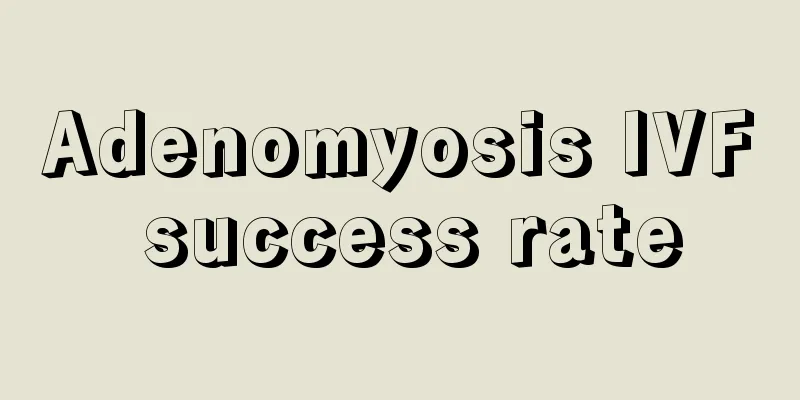Do you know how hypothyroidism affects pregnancy and fetus?

|
"Hypothyroidism" is very common in clinical medicine. It refers to hypothyroidism caused by insufficient secretion of thyroid hormones. It can cause infertility and hypothyroidism during pregnancy by affecting the functions of the hypothalamus, pituitary gland, and gonadal axis. For the normal development of the fetus, female friends need to pay special attention to this situation, seek medical treatment as soon as possible, and recover their health as soon as possible. 1. Hypothyroidism Hypothyroidism is a disease caused by insufficient secretion of thyroid hormone. Subclinical hypothyroidism refers to the absence of clinical symptoms, only elevated serum TSH. The incidence of hypothyroidism in women of childbearing age is approximately 2-4%, while the incidence of subclinical hypothyroidism is approximately 14%. 2. Effects of hypothyroidism on pregnancy and fetus 1. Causes infertility by affecting the function of the hypothalamus-pituitary-gonadal axis. 1) When hypothyroidism occurs, TSH increases, accompanied by an increase in prolactin (PRL), causing amenorrhea, low libido and infertility in women. 2) Hypothyroidism causes a decrease in the body's metabolic rate, a reduction in sex hormone-binding protein, and aromatase synthesis disorders, resulting in ovulation disorders. 3) Hypothyroidism causes non-pulsatile secretion of hypothalamic GnRH hormone, increased secretion of pituitary follicle-stimulating hormone and luteinizing hormone, leading to luteal insufficiency. 4) During hypothyroidism, the synthesis of coagulation factors in the body decreases, causing frequent menstruation, menorrhagia, and infertility. 2. Impact of hypothyroidism during pregnancy 1) Hypothyroidism during pregnancy can cause miscarriage, fetal growth restriction, affect the development of the fetal cerebral cortex, and even stillbirth. 2) Hypothyroidism during pregnancy is associated with adverse obstetric outcomes such as gestational hypertension, placental abruption, postpartum hemorrhage, premature birth, and low birth weight. 3) Subclinical hypothyroidism is difficult to detect and is also associated with the above-mentioned adverse obstetric outcomes. 4) Subclinical hypothyroidism may affect children's IQ. Treatment of hypothyroidism 1) Hypothyroidism or subclinical hypothyroidism during pregnancy and pregnancy should be treated. 2) Take levothyroxine tablets orally and control the serum TSH level to less than 2.5mIU/L before trying to conceive. 3) After pregnancy, the dose of levothyroxine should be increased appropriately, and TSH and FT4 should be monitored every 4 weeks. 4) TSH should be controlled at 0.1-2.5mIU/L in early pregnancy, and at 0.2-3.0mIU/L in mid- and late pregnancy. |
<<: What to eat to enlarge breasts during menstruation
>>: What are the symptoms and nursing measures of female periarthritis of shoulder
Recommend
Lower abdominal distension and pain
The lower abdomen is located in the belly. This i...
Can I eat hot pot when I am eight months pregnant?
Hot pot is a relatively overbearing delicacy and ...
Why do women experience excruciating pain during childbirth?
Every woman has to go through the process of gett...
What kind of material is good for baking tools? How to clean baking tools for the first time?
There is still a considerable gap between my coun...
Can I draw blood from a pregnant woman for paternity testing?
If you want to do a paternity test, you can draw ...
How to detect pelvic adhesions
How to detect pelvic adhesion? Let's not rush...
What are the precautions for fallopian tube recanalization?
Fallopian tube recanalization is indeed an effect...
What are the dangers of ectopic pregnancy?
Ectopic pregnancy is a problem that many women of...
What are the benefits of eating black dates for women
Black dates are a common type of dates in our liv...
Let’s list what foods can help discharge blood? Recommend these 7 delicacies!
When women have their periods, they will experien...
Symptoms of premature rupture of membranes in four months of pregnancy
If premature rupture of membranes occurs around f...
Are pituitary tumors serious?
The impact of pituitary tumors is relatively larg...
Can I use force to relieve constipation during early pregnancy?
In the early stages of pregnancy, the formation o...
What's wrong with a little vaginal bleeding?
With the increase of life pressure, many women ne...
What anti-inflammatory medicine is good for sex ten days after abortion?
After a woman becomes pregnant, she may choose to...







![[Medical Q&A] How to prevent psoriatic arthritis?](/upload/images/67f106031c7ef.webp)

